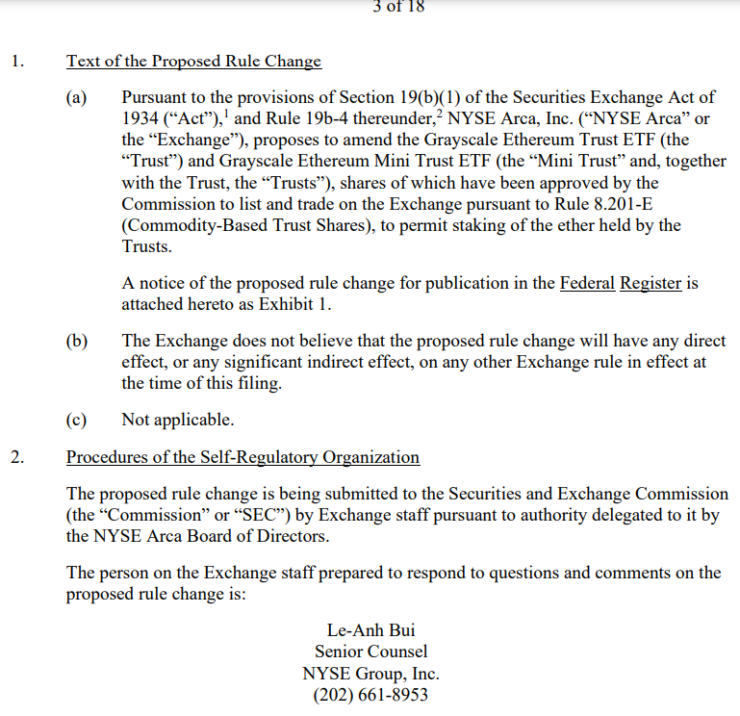The race to innovate in the cryptocurrency exchange-traded fund (ETF) space is heating up, with Grayscale now seeking approval to introduce staking in its spot Ethereum (ETH) ETFs. If approved, this move could reshape the way institutional and retail investors engage with Ethereum, unlocking new revenue opportunities and potentially setting a precedent for future crypto investment products.
NYSE Files on Behalf of Grayscale for Staking Integration
On Feb. 14, the New York Stock Exchange (NYSE) filed a request with the U.S. Securities and Exchange Commission (SEC) on behalf of Grayscale to permit staking within its Grayscale Ethereum Trust ETF (ETHE) and Grayscale Ethereum Mini Trust ETF (ETH). This marks a major step in bringing the yield-generating mechanism of staking to traditional financial markets through an SEC-regulated product.

According to the filing, Grayscale intends to stake a portion of the funds’ Ether holdings to earn staking rewards, which would be treated as income for the funds. This would allow investors to benefit from Ethereum’s proof-of-stake (PoS) consensus model while maintaining exposure to ETH through an ETF structure.
No Guaranteed Returns, But Added Benefits for Investors
Grayscale clarified that it will not promote or guarantee specific returns from staking activities. Instead, it emphasized that staking would offer tangible benefits to investors by:
- Enhancing the creation and redemption process for ETF shares
- Increasing fund efficiency
- Allowing investors to capture the additional yield from staking
The estimated staking reward rate for Ethereum currently sits at 2.06%, according to data from Coinbase, which could present an attractive passive income stream for investors.
Additionally, the filing states:
“Allowing the Trusts to stake their Ether would benefit investors by permitting the Trusts to exercise their rights to free additional Ether and help the Trusts better track the returns associated with holding Ether.”
Grayscale also clarified that its staking model would not involve “staking as a service” or delegated staking, meaning the company is not acting as an intermediary offering staking services directly to customers.
21Shares Filed a Similar Proposal, Indicating a Broader Trend
Grayscale is not the first major asset manager to push for staking in Ethereum ETFs. Just days earlier, 21Shares became the first to file a similar proposal, with CBOE BZX Exchange submitting an application to the SEC on its behalf.
Previously, in May 2024, 21Shares had removed staking from its spot Ether ETF proposal, as the SEC had required issuers to exclude staking to gain approval. This was part of the SEC’s cautious stance on crypto staking, citing concerns over regulatory classification and potential risks to investors.
However, with the Trump administration signaling a more favorable approach to crypto, there is growing speculation that the SEC could revisit its policy on staking in ETFs.
Regulatory Shift Underway? SEC’s Stance May Be Softening
According to Jito and Multicoin Capital, there are indications that the SEC’s stance on staking might be evolving:
“We understand the [SEC] Staff may now be amenable to revisiting staking in ETH and other crypto asset ETPs, including in connection with new applications filed for a SOL ETP.”
This potential shift could pave the way for more ETF providers to integrate staking, not just for Ethereum but also for other proof-of-stake cryptocurrencies, such as Solana (SOL).
A New Era for Crypto ETFs?
If the SEC approves staking within spot Ether ETFs, it could represent a paradigm shift in how traditional investors interact with crypto assets. Passive yield generation, previously accessible only through direct crypto ownership or staking service providers, could now become available through regulated financial products.
For institutional investors, this could significantly enhance Ethereum’s attractiveness as an investable asset. For retail investors, it could offer a new way to earn rewards without directly managing private keys or dealing with the complexities of crypto staking.
Conclusion
Grayscale’s proposal to integrate staking in Ethereum ETFs is a significant development in the ongoing institutionalization of crypto assets. While regulatory uncertainty remains, the growing number of ETF providers lobbying for staking approval suggests that the SEC may be under pressure to adapt to the evolving market.
With the SEC’s decision on this proposal pending, all eyes will be on how the regulatory agency navigates the balance between investor protection and fostering crypto innovation. If approved, this could set the stage for a new wave of staking-enabled ETFs, offering investors a compelling blend of crypto exposure and yield generation.





